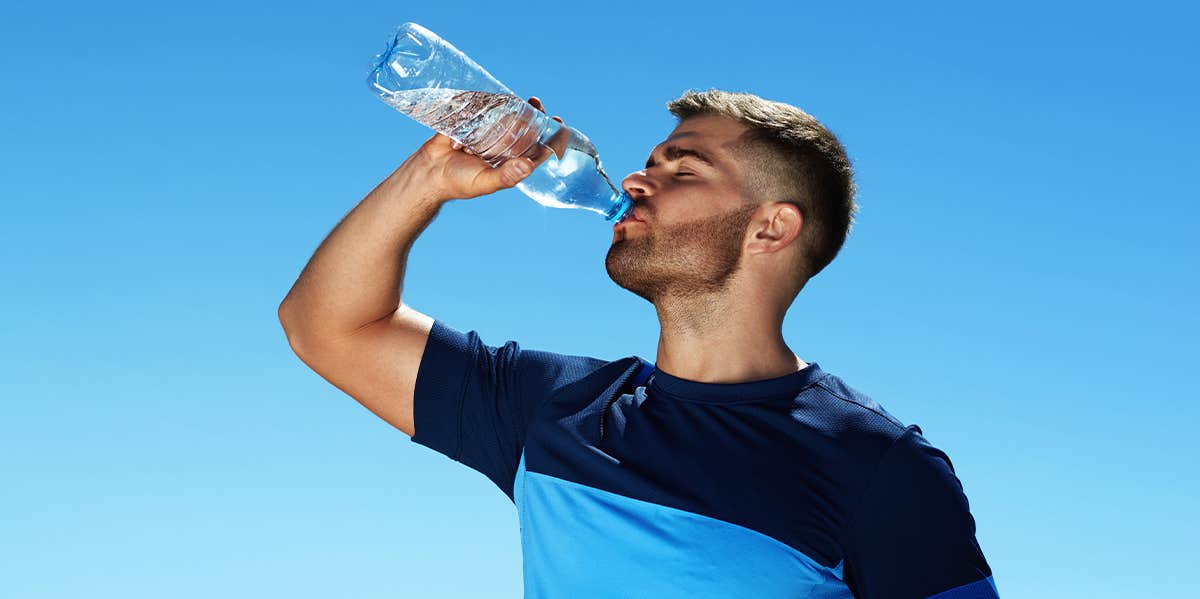The Hidden Danger In Bottled Water Damaged My Husband’s Health
The reason behind his symptoms and disrupted hormone levels may surprise you.
 puhhha / Shutterstock
puhhha / Shutterstock For many years, I relied on bottled water for everything — cooking, coffee, tea, and everyday drinking. My shopping list always included a couple of cases to restock our water inventory. And while I’d heard about the dangers of BPA — an industrial chemical called bisphenol-A often used to make plastic water bottles — I didn’t pay much attention to it.
But that all changed after my husband began a specialized program of diet and exercise designed to increase his gains in the gym and improve his overall health. After six months on the program, his doctor suggested a complete blood panel to get an update on his progress.
The results were surprising.
While his testosterone levels had increased, his estrogen levels were twice the normal range.
His doctor wrote a prescription medication to bring his levels back into balance. He explained how elevated estrogen in men can cause insomnia, reduce the effectiveness of increased testosterone count and, most importantly, increase the production of blood plasma proteins — raising the risk of blood clots and related heart risks.
For the sake of my husband’s health, his estrogen had to be lowered — and quickly.
But there was an underlying problem we hadn’t anticipated.
The drug prescribed by his doctor (Anastrozole, also known as Arimidex) had side effects. According to WebMD, the medication can cause drug-induced insomnia — my husband called it brain-buzz — preventing him from getting more than two to three hours of sleep a night.
After several weeks of walking around like a zombie, he decided to stop taking the pills and get some rest.
Over the next few months, we tried incorporating different foods into his diet to try to lower his estrogen naturally. But his follow-up blood work showed very little difference in his elevated estrogen levels.
We needed to find the culprit that was causing his hormonal imbalance. Our diet was healthy and clean. And taking a drug to ease the symptoms wasn’t an acceptable solution. So I began doing more research into BPA.
After reading an article by Dr. Geo of The Science of Living Long and Strong, I learned that plastic bottles can release BPA when they get hot. During and after transport from bottling plants, the containers are subjected to heat in warehouse storage, the trunk of your car, or in your garage — especially during the summer months.
The real problem?
BPA can imitate estrogen in the human body according to a 2017 article by Yvette Brazier in Medical News Today. Research has also shown exposure to BPA can have possible health effects on the brain, behavior, and prostate gland of fetuses, infants, and children.
Although the FDA has denied any health risks from ingesting BPA leached from plastic food and beverage containers, the European Union and Canada have banned BPA in the manufacture of baby bottles.
Additional medical research has also suggested the possibility of a link between BPA and increased blood pressure. In a 2018 National Geographic article by Maya Wei-Haas, even so-called non-BPA plastic can release bisphenol-S (or BPS for short). And you don’t want either one contaminating your drinking water.
I immediately began looking for an alternative to bottled water.
After exploring the many options, we chose a countertop filtration system we now use for all our drinking and cooking needs.
The result? Six months later, my husband’s blood tests showed his estrogen levels had returned to a normal range.
Was it because we stopped drinking bottled water? We’re sure of it — because switching to clean, filtered on-demand water was the only change we’d made to his diet, vitamin supplements, or medications.
Like many people, I’d always thought bottled water was an easy, healthy option.
Yet, from my husband’s experience, I’ve learned the chemicals released from plastic bottles can have all kinds of negative effects on our health.
The bottom line: If you’re drinking bottled water, consider doing some research and finding an alternative. Ideally, look for a filtration system that removes at least 95 percent (or more) of all dangerous contaminants.
When evaluating different systems, compare test results from independent laboratories. If a manufacturer doesn’t include this information in their descriptions, ask them why they don’t publish third-party test results, or simply find a company that does.
Most important, put your health first — and leave the bottled water in the store, where it can’t harm you.
Jill Reid is the author of the Real Life Book Series and founder of Pathway to Personal Growth.

